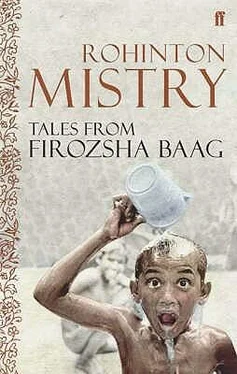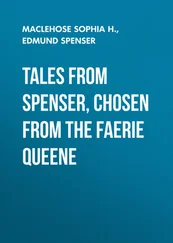Rohinton Mistry - Tales From Firozsha Baag
Здесь есть возможность читать онлайн «Rohinton Mistry - Tales From Firozsha Baag» весь текст электронной книги совершенно бесплатно (целиком полную версию без сокращений). В некоторых случаях можно слушать аудио, скачать через торрент в формате fb2 и присутствует краткое содержание. Год выпуска: 2006, Издательство: Faber & Faber, Жанр: Современная проза, на английском языке. Описание произведения, (предисловие) а так же отзывы посетителей доступны на портале библиотеки ЛибКат.
- Название:Tales From Firozsha Baag
- Автор:
- Издательство:Faber & Faber
- Жанр:
- Год:2006
- ISBN:нет данных
- Рейтинг книги:3 / 5. Голосов: 1
-
Избранное:Добавить в избранное
- Отзывы:
-
Ваша оценка:
- 60
- 1
- 2
- 3
- 4
- 5
Tales From Firozsha Baag: краткое содержание, описание и аннотация
Предлагаем к чтению аннотацию, описание, краткое содержание или предисловие (зависит от того, что написал сам автор книги «Tales From Firozsha Baag»). Если вы не нашли необходимую информацию о книге — напишите в комментариях, мы постараемся отыскать её.
Tales From Firozsha Baag — читать онлайн бесплатно полную книгу (весь текст) целиком
Ниже представлен текст книги, разбитый по страницам. Система сохранения места последней прочитанной страницы, позволяет с удобством читать онлайн бесплатно книгу «Tales From Firozsha Baag», без необходимости каждый раз заново искать на чём Вы остановились. Поставьте закладку, и сможете в любой момент перейти на страницу, на которой закончили чтение.
Интервал:
Закладка:
Dr. Mody sat at his desk, shoulders sagging, his hands dangling over the arms of the chair. The desk was bare — not a single stamp anywhere in sight, and the cupboard in the corner locked. The absence of his habitual, comfortable clutter made the room cold and cheerless. He was in low spirits; instead of the crow’s-feet at the corners of his eyes were lines of distress and dejection.
“No album again?”
“No. Haven’t got any new stamps yet,” Jehangir smiled nervously.
Dr. Mody scratched the psoriasis on his elbows. He watched Jehangir carefully as he spoke. “Something very bad has happened to the Spanish dancing-lady stamp. Look,” and he displayed the satin-covered box minus its treasure. “It is missing.” Half-fearfully, he looked at Jehangir, afraid he would see what he did not want to. But it was inevitable. His last sentence evoked the head prefect’s thundering debating-style speech of a few days ago, and the ugliness of the entire episode revisited Jehangir’s features — a final ignominious postscript to Dr. Mody’s loss and disillusion.
Dr. Mody shut the box. The boy’s reaction, his silence, the absence of his album, confirmed his worst suspicions. More humiliatingly, it seemed his wife was right. With great sadness he rose from his chair. “I have to leave now, something urgent at the College.” They parted without a word about next Sunday.
Jehangir never went back. He thought for a few days about the missing stamp and wondered what could have happened to it. Burjor Uncle was too careful to have misplaced it; besides, he never removed it from its special box. And the box was still there. But he did not resent him for concluding he had stolen it. His guilt about Patla Babu and Jhaaria Babu , about Eric and the stamps was so intense, and the punishment deriving from it so inconsequential, almost non-existent, that he did not mind this undeserved blame. In fact, it served to equilibrate his scales of justice.
His mother questioned him the first few Sundays he stayed home. Feeble excuses about homework, and Burjor Uncle not having new stamps, and it being boring to look at the same stuff every Sunday did not satisfy her. She finally attributed his abnegation of stamps to sensitivity and a regard for the unfortunate state of the Modys’ domestic affairs. It pleased her that her son was capable of such concern. She did not press him after that.
IV
Pesi was no longer to be seen in Firozsha Baag. His absence brought relief to most of the parents at first, and then curiosity. Gradually, it became known that he had been sent away to a boarding-school in Poona.
The boys of the Baag continued to play their games in the compound. For better or worse, the spark was lacking that lent unpredictability to those languid coastal evenings of Bombay; evenings which could so easily trap the unwary, adult or child, within a circle of lassitude and depression in which time hung heavy and suffocating.
Jehangir no longer sat on the stone steps of C Block in the evenings. He found it difficult to confront Dr. Mody day after day. Besides, the boys he used to watch at play suspected some kind of connection between Pesi’s being sent away to boarding-school, Jehangir’s former friendship with Dr. Mody, and the emerging of Dr. Mody’s constant sorrow and despair (which he had tried so hard to keep private all along, and had succeeded, but was now visible for all to see). And the boys resented Jehangir for whatever his part was in it — they bore him open antagonism.
Dr. Mody was no more the jovial figure the boys had grown to love. When his car turned into the compound in the evenings, he still waved, but no crow’s-feet appeared at his eyes, no smile, no jokes.
Two years passed since the Mody family’s arrival in Firozsha Baag.
In school, Jehangir was as isolated as in the Baag. Most of his effeminateness had, of late, transformed into vigorous signs of impending manhood. Eric D’Souza had been expelled for attempting to sodomize a junior boy. Jehangir had not been involved in this affair, but most of his classmates related it to the furtive activities of their callow days and the stamp-flicking. Patla Babu and Jhaaria Babu had disappeared from the pavement outside St. Xavier’s. The Bombay police, in a misinterpretation of the nation’s mandate: garibi hatao — eradicate poverty, conducted periodic round-ups of pavement dwellers, sweeping into their vans beggars and street-vendors, cripples and alcoholics, the homeless and the hungry, and dumped them somewhere outside the city limits; when the human detritus made its way back into the city, another clean-up was scheduled. Patla and Jhaaria were snared in one of these raids, and never found their way back. Eyewitnesses said their stalls were smashed up and Patla Babu received a lathi across his forehead for trying to salvage some of his inventory. They were not seen again.
Two years passed since Jehangir’s visits to Dr. Mody had ceased.
It was getting close to the time for another transfer for Dr. Mody. When the inevitable orders were received, he went to Ahmedabad to make arrangements. Mrs. Mody was to join her husband after a few days. Pesi was still in boarding-school, and would stay there.
So when news arrived from Ahmedabad of Dr. Mody’s death of heart failure, Mrs. Mody was alone in the flat. She went next door with the telegram and broke down.
The Bulsaras helped with all the arrangements. The body was brought to Bombay by car for a proper Parsi funeral. Pesi came from Poona for the funeral, then went back to boarding-school.
The events were talked about for days afterwards, the stories spreading first in C Block, then through A and B. Commiseration for Mrs. Mody was general. The ordeal of the body during the two-day car journey from Ahmedabad was particularly horrifying, and was discussed endlessly. Embalming was not allowed according to Parsi rituals, and the body in the trunk, although packed with ice, had started to smell horribly in the heat of the Deccan Plateau which the car had had to traverse. Some hinted that this torment suffered by Dr. Mody’s earthly remains was the Almighty’s punishment for neglecting his duties as a father and making Mrs. Mody so unhappy. Poor Dr. Mody, they said, who never went a day without a bath and talcum powder in life, to undergo this in death. Someone even had, on good authority, a count of the number of eau de cologne bottles used by Mrs. Mody and the three occupants of the car over the course of the journey — it was the only way they could draw breath, through cologne-watered handkerchiefs. And it was also said that ever after, these four could never tolerate eau de cologne — opening a bottle was like opening the car trunk with Dr. Mody’s decomposing corpse.
A year after the funeral, Mrs. Mody was still living in Firozsha Baag. Time and grief had softened her looks, and she was no longer the harsh and dour-faced woman Jehangir had seen during his first Sunday visit. She had decided to make the flat her permanent home now, and the trustees of the Baag granted her request “in view of the unfortunate circumstances.”
There were some protests about this, particularly from those whose sons or daughters had been postponing marriages and families till flats became available. But the majority, out of respect for Dr. Mody’s memory, agreed with the trustees’ decision. Pesi continued to attend boarding-school.
One day, shortly after her application had been approved by the trustees, Mrs. Mody visited Mrs. Bulsara. They sat and talked of old times, when they had first moved in, and about how pleased Dr. Mody had been to live in a Parsi colony like Firozsha Baag after years of travelling, and then the disagreements she had had with her husband over Pesi and Pesi’s future; tears came to her eyes, and also to Mrs. Bulsara’s, who tugged at a corner of her mathoobanoo to reach it to her eyes and dry them. Mrs. Mody confessed how she had hated Jehangir’s Sunday visits although he was such a fine boy, because she was worried about the way poor Burjorji was neglecting Pesi: “But he could not help it. That was the way he was. Sometimes he would wish Khoedai had given him a daughter instead of a son. Pesi disappointed him in everything, in all his plans, and …” and here she burst into uncontrollable sobs.
Читать дальшеИнтервал:
Закладка:
Похожие книги на «Tales From Firozsha Baag»
Представляем Вашему вниманию похожие книги на «Tales From Firozsha Baag» списком для выбора. Мы отобрали схожую по названию и смыслу литературу в надежде предоставить читателям больше вариантов отыскать новые, интересные, ещё непрочитанные произведения.
Обсуждение, отзывы о книге «Tales From Firozsha Baag» и просто собственные мнения читателей. Оставьте ваши комментарии, напишите, что Вы думаете о произведении, его смысле или главных героях. Укажите что конкретно понравилось, а что нет, и почему Вы так считаете.












